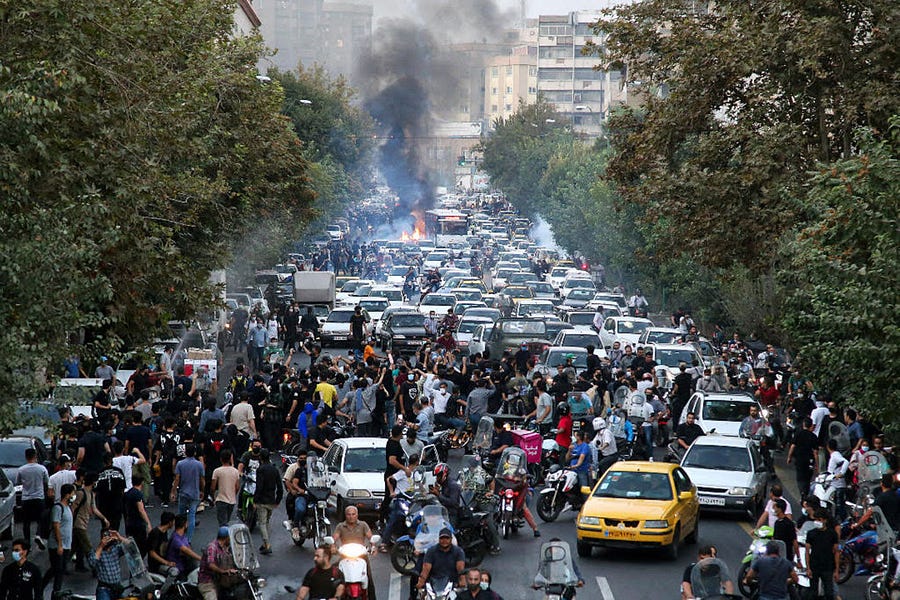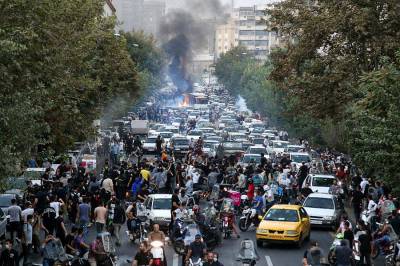The Islamic Republic of Iran is in trouble. Anti-regime demonstrations precipitated by the murder of 22-year-old Mahsa Amini for the sin of a loose hijab show no signs of abating. And though he has now reappeared in public, Supreme Leader Ayatollah Ali Khamenei was reportedly seriously unwell in recent weeks, with ill-concealed jockeying over succession spilling out into the open. Even the once reliable Biden administration has piled on, with National Security Adviser Jake Sullivan condemning the regime’s “brutal and violent repression.”
So why in these fraught times would the leadership of Iran want to come back to the nuclear negotiating table? Because it is now desperate to buy off the restive opposition movement. Despite suggestions that the regime has a handle on the broad coalition that has taken to the streets night after night, reports of exhaustion and the deaths of at least 20 members of the security forces would indicate otherwise. And though sanctions enforcement by the Biden administration has been lackluster, the Iranian economy is in trouble. Tehran wants carte blanche from America to “restabilize” the country. Sanctions relief from a revived JCPOA will give it the money it needs to jump start the economy, and theoretically restore the United States to its erstwhile Obama-era role of advocate for Tehran in the region.
Still, as recently as September 20, in a meeting between Iranian President Ebrahim Raisi and French President Emanuel Macron, all signs pointed to failure in the ongoing multilateral talks to revive the 2015 Joint Comprehensive Plan of Action (JCPOA), the Iran nuclear deal. But that was before Amini and probably at least 50 other Iranian civilians were killed. Abruptly, the regime about-faced.
Four days after Raisi’s meeting with Macron, Iranian Foreign Minister Hossein Amir Abdollahian granted an exclusive interview to the Al-Monitor newspaper, touching on some of the most stubborn issues bedeviling U.S-Iran relations. Vienna-based talks aimed at reviving the JCPOA had been stalled over International Atomic Energy Agency (IAEA) concerns about ongoing nuclear weapons work. Tehran vowed there would be no deal without the summary closure of the IAEA files. Suddenly everything changed.
The IAEA “has questions about three alleged sites that they say they have found uranium,” Abdollahian told Al-Monitor, “and we are ready to provide answers to those questions.” Iran will grant access to the IAEA “beyond safeguards,” he added. Abdollahian even reversed Tehran’s long-standing refusal to speak directly with the United States. How about the American hostages held in Iran? An exchange of prisoners? The minister professed his government “absolutely ready.”
Days later, two Iranian-Americans being held were liberated, one with a prison furlough and another from a travel ban instituted after he traveled to Iran to plead for his imprisoned son. Iranian officials insist the release was conditioned on a payoff of $7 billion in Iranian assets held in a South Korean bank. The Biden administration denied there was any quid pro quo, and there are still several other Americans languishing in Iranian prisons. Nonetheless, the direction of the wind is clear: The door has reopened to negotiations. For the Tehran regime, this is a tried-and-true strategy to gain relief. The Iranians remember 2009.
In the early days of the Obama administration, Iran’s opposition Green Movement took to the streets to protest a fraudulent presidential election. In response, the regime came out in full force to quell what were then the largest such demonstrations since the 1979 revolution. Dozens of civilians were killed (as well as 23 security forces), while many others were imprisoned or disappeared.
Faced with demands from Congress to speak out, the newly installed Obama administration was virtually silent. America’s new president was so reluctant to touch the issue, he waited 11 days to make a statement and even then refused to admit the Iranian election had been stolen. After a perfunctory condemnation of the regime’s “unjust actions,” Barack Obama went on to insist that, “I’ve made it clear that the United States respects the sovereignty of the Islamic Republic of Iran and is not interfering with Iran's affairs.”
A subsequent 2016 book, The Iran Wars, laid bare what was happening behind the scenes. The CIA was ordered to sever links with Iran’s Green Movement, and aides pressing to support democratic demonstrators were overruled. Why? As Obama had made clear in his 2012 reelection campaign, he had a vision of a Pax Iranica in the Middle East.
The Green Movement and its ill-timed demands for democracy were an obstacle to realizing Obama’s dream of a new era in Washington-Tehran relations. So, he allowed himself to become complicit in suppressing the demonstrators. A deal eluded him in 2009, but ultimately he succeeded in inking the JCPOA in 2015.
Tehran’s calculus when the Iran deal was signed was clear: Give up immediate satisfaction on the nuclear weapons program for progress down the road and a free hand everywhere else. Hire the Obama administration as a “lawyer” to defend against criticism, and downplay violations of both the nuclear deal and escalations elsewhere.
Will the Biden administration, desperate for a foreign policy win and the revitalization of the Iran nuclear deal, take the bait being proffered by the beleaguered Tehran regime? It worked once. We can only hope it doesn’t again.






Please note that we at The Dispatch hold ourselves, our work, and our commenters to a higher standard than other places on the internet. We welcome comments that foster genuine debate or discussion—including comments critical of us or our work—but responses that include ad hominem attacks on fellow Dispatch members or are intended to stoke fear and anger may be moderated.
With your membership, you only have the ability to comment on The Morning Dispatch articles. Consider upgrading to join the conversation everywhere.